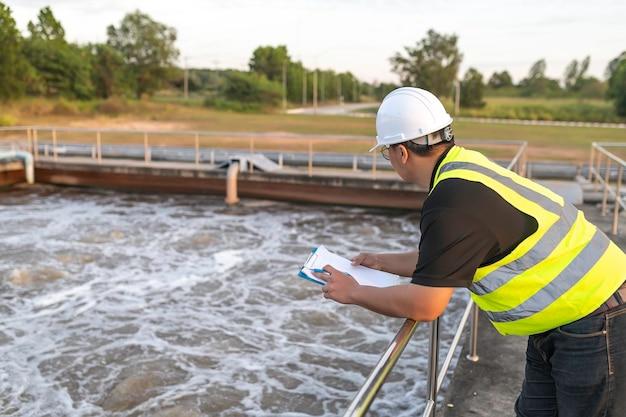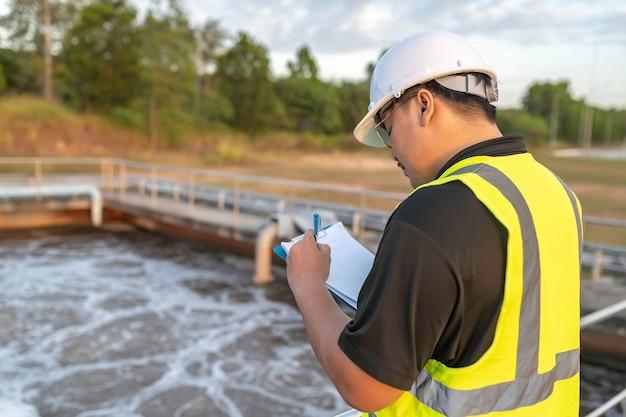Environmental engineering plays a crucial role in addressing our planet’s most pressing issues. As we face escalating challenges such as climate change, pollution, and resource depletion, the importance of environmental engineering becomes even more evident. This field offers innovative solutions to mitigate the impact of human activities on the environment and safeguard our natural resources for future generations.
Environmental engineers are problem solvers who tackle a wide range of issues, including water and air pollution control, waste management, sustainable development, and renewable energy. Through their expertise and knowledge, they promote sustainable practices, design efficient systems, and implement strategies to reduce pollution and conserve resources.
Join me in discovering the significance of environmental engineering, its applications, and the rewarding career opportunities it offers in the ever-evolving environmental landscape. Let’s explore how environmental engineering can pave the way for a more sustainable future in 2023 and beyond.

Why Environmental Engineering is Vital in Today’s World
In a world faced with numerous environmental challenges, it’s no surprise that the role of environmental engineering has become increasingly important. From climate change to pollution control, environmental engineers play a crucial role in finding sustainable solutions. Let’s dive into why environmental engineering is so vital in today’s world.
Addressing Climate Change and Renewable Energy
One of the primary reasons why environmental engineering is essential is its focus on combating climate change. Environmental engineers work tirelessly to develop and implement innovative technologies that promote renewable energy sources. By harnessing the power of wind, solar, and other renewable resources, they contribute to reducing our dependence on fossil fuels and mitigating the adverse effects of climate change.
Protecting Air and Water Quality
Environmental engineers also play a significant role in preserving air and water quality. With ever-increasing pollution levels, their expertise is crucial in designing and implementing systems that control emissions from industrial processes and ensure clean, safe drinking water for communities. Through advanced filtration and treatment methods, environmental engineers safeguard public health and maintain the delicate balance of the ecosystem.
Waste Management and Resource Recovery
Proper waste management is another area where environmental engineering shines. With the world’s population steadily rising, the need for efficient waste management systems is paramount. Environmental engineers develop innovative techniques to reduce, recycle, and safely dispose of waste. They also focus on resource recovery, finding ways to extract valuable materials from waste, reducing the burden on landfills, and promoting a circular economy.
Sustainable Urban Development
As cities grow and expand, environmental engineering plays a crucial role in creating sustainable urban environments. By implementing green infrastructure practices such as rain gardens and permeable pavements, environmental engineers help manage stormwater runoff, mitigate flooding, and improve overall water quality. Additionally, they work on designing energy-efficient buildings and sustainable transportation systems, reducing carbon emissions and promoting a healthier living environment.
Protecting Ecosystems and Biodiversity
Environmental engineers understand the intricate relationships between ecosystems and human activities. By implementing effective environmental management plans, they help mitigate the impacts of development and industrial activities on biodiversity. Through habitat restoration projects, wildlife conservation efforts, and sustainable land use practices, environmental engineers strive to maintain the delicate balance between human needs and the preservation of ecosystems for future generations.
Conclusion: The Importance of Environmental Engineering
Environmental engineering is more critical now than ever before. With the challenges posed by climate change, air and water pollution, waste management, urban development, and biodiversity loss, environmental engineers offer innovative solutions to protect the planet and ensure a sustainable future. By harnessing their expertise and ingenuity, we can work towards a world where humans and the environment coexist harmoniously. So, let’s appreciate the invaluable contributions of these unsung heroes who are tirelessly working to make our world a better place.
Remember, the importance of environmental engineering is not merely in safeguarding the planet, but also in preserving the quality of life for all living beings. Let’s join hands and support the endeavors of environmental engineers as they strive to create a greener and more sustainable future for us all.

FAQ: Why is Environmental Engineering Important?
What problems do environmental engineers solve
Environmental engineers are problem solvers who tackle a wide range of environmental issues. They work to address pollution, waste management, water and air quality, and the impact of human activities on the environment. With their expertise, they develop sustainable solutions to protect our planet and ensure a healthier future for all.
Why is environmental engineering important
Environmental engineering plays a vital role in safeguarding our environment and promoting sustainable development. By applying scientific principles, environmental engineers find innovative ways to minimize pollution, conserve resources, and improve the quality of our air, water, and land. Their work directly contributes to a healthier and more sustainable planet.
What university has the best environmental science program
While many universities offer excellent environmental science programs, some notable names stand out. Stanford University, Massachusetts Institute of Technology (MIT), and Yale University consistently rank among the top institutions for environmental science. However, it’s important to research and choose a program that aligns with your specific interests and career goals.
In what ways can environmental engineering offer solutions to different environmental issues
Environmental engineering offers a wide range of solutions to address various environmental issues. It involves designing and implementing effective waste management systems, developing renewable energy sources, improving water treatment processes, and mitigating pollution. By integrating scientific knowledge and engineering principles, environmental engineers contribute to sustainable development and the preservation of our natural resources.
What are the highest paying environmental jobs
Environmental engineering offers lucrative career opportunities. Some of the highest-paying positions in this field include environmental consultant, environmental project manager, environmental health and safety specialist, and environmental engineer in the oil and gas industry. These roles not only offer financial stability but also allow individuals to make a positive impact on the environment.
What companies hire environmental engineers
Several companies value the expertise of environmental engineers and actively hire them. Some prominent names in environmental engineering employment include AECOM, Jacobs Engineering Group, CH2M Hill, Tetra Tech, and Black & Veatch. These companies provide diverse projects and career growth opportunities to environmental engineers.
What is the application of environmental engineering
The application of environmental engineering is extensive and covers various sectors. Environmental engineers contribute to the design and implementation of sustainable infrastructure, waste management systems, water treatment plants, air pollution control measures, and renewable energy projects. Their work encompasses industries, municipalities, consulting firms, research organizations, and government agencies.
Where are the most environmental engineering jobs
Environmental engineering jobs can be found throughout the United States, with some regions offering more opportunities than others. States like California, Texas, New York, Florida, and Pennsylvania have a high demand for environmental engineers. However, job availability can also vary depending on specific environmental challenges and government initiatives in each area.
What is the role of environmental engineer
The role of an environmental engineer is multifaceted. Environmental engineers design and implement solutions to prevent or mitigate various environmental issues. They conduct research, collect and analyze data, and develop plans for environmental improvement projects. They also collaborate with stakeholders, participate in environmental impact assessments, and ensure compliance with environmental regulations.
Do environmental engineers travel
Yes, environmental engineers often have opportunities to travel as part of their job. They may visit project sites, conduct field investigations, or collaborate with clients and stakeholders in different locations. This aspect adds an exciting and dynamic element to the work of environmental engineers.
Which environmental degree is best
Several environmental degrees can lead to a successful career in environmental engineering. Some of the most esteemed degrees include a Bachelor of Science in Environmental Engineering, a Master of Science in Environmental Engineering, or a Master of Science in Environmental Science. Choosing the appropriate degree depends on your specific goals and the level of expertise you wish to attain.
What can I do after environmental engineering
The options for career paths after completing a degree in environmental engineering are extensive. Graduates can work in sectors such as municipal water and wastewater treatment, air quality management, environmental consulting, government agencies, and research institutions. Additionally, some choose to pursue further education or specialize in areas like sustainable energy, pollution control, or environmental policy.
Do environmental engineers get paid well
Yes, environmental engineers are well-compensated for their expertise and contributions. Salaries for environmental engineers vary depending on factors such as job experience, qualifications, and location. On average, environmental engineers earn a salary of around $80,000 to $100,000 per year, with the potential for higher earnings for those in senior positions or specialized roles.
Why is environmental engineering a good career
Environmental engineering is a rewarding career choice for several reasons. It allows individuals to actively contribute to sustainable development, make a positive impact on the environment, and address pressing global challenges. The field offers diverse job opportunities, intellectual stimulation, and the satisfaction of knowing that your work directly contributes to the well-being of both current and future generations.
How do I start an environmental career
Starting an environmental career begins with acquiring the necessary education and skills. You can pursue a degree in environmental engineering or a related field. Engaging in internships or cooperative education programs during your studies can provide valuable practical experience. Networking with professionals in the field and joining relevant industry associations can also help you find job opportunities and stay up to date with the latest developments.
Do environmental jobs pay well
Yes, environmental jobs can be financially rewarding, particularly in specialized fields such as environmental engineering. Salaries vary based on factors like education, experience, and job location. Occupational specialties such as environmental consulting, project management, and environmental health and safety offer particularly competitive salaries.
What skills should an environmental engineer have
Environmental engineers should possess a diverse set of skills. These include strong analytical and problem-solving abilities, proficiency in technical and scientific knowledge, effective communication skills, and the ability to collaborate with diverse stakeholders. Additionally, knowledge of sustainability principles, environmental regulations, and familiarity with relevant software and tools are essential for success in this field.
Is environmental engineering good
Absolutely! Environmental engineering is a highly valuable field with immense potential for positive impact. It combines scientific knowledge, engineering principles, and innovation to find sustainable solutions for a wide range of environmental challenges. By pursuing a career in environmental engineering, you contribute to the well-being of our planet and help shape a more sustainable future for generations to come.
Remember, environmental engineering is not just about saving the world; it’s about doing it with flair and a touch of humor. So, let your passion for the environment shine through as you embark on a career that is as essential as it is rewarding.
